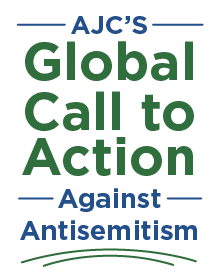Since the October 7 Hamas terror attacks against Israel, antisemitic incidents have increased exponentially around the world – by 400% in the U.S., 500% in Australia, 600% in the UK, 320% in Germany, and 960% in Brazil. In France, home to the largest Jewish community in Europe, the number of antisemitic incidents in the three months following October 7 equaled those of the previous three years combined. These numbers are shocking. It’s time to declare a global state of emergency for the Jewish people.
Modeled after its Call to Action Against Antisemitism in America, American Jewish Committee (AJC), the global advocacy organization for the Jewish people, and partner Jewish communities around the world are issuing this Global Call to Action Against Antisemitism to mobilize and empower leaders to take bold action now.
Governmental Action Items
- Governments should adopt and use the IHRA Working Definition of Antisemitism. To counter antisemitism, it must be understood. The IHRA Working Definition of Antisemitism is the universally accepted definitional tool used by 41 UN Member States to identify antisemitism.
- Government and law enforcement must meet the Jewish community’s security needs. Governments should collaborate with Jewish community security professionals, provide police protection, and fund necessary security enhancements to protect Jewish schools, synagogues, and community centers that are under threat.
- Every level of government should consider adopting its own strategy to counter antisemitism. National strategies to counter antisemitism are effective when they engage all levels of government with specific, time-bound responsibilities. A national coordinator with authority and resources can ensure government coordination and strategy implementation.
- Government leaders must speak out unequivocally. Leaders at all levels of government must speak out whenever antisemitism occurs, including when antisemitism is masquerading as anti-Zionism. Strong condemnations should come immediately and specifically call out antisemitism.
- Prosecutors and law enforcement must investigate and prosecute hate crimes to the fullest extent of the law. Ensuring broad awareness of convictions is a powerful deterrent.
- Elected officials must depoliticize the fight against antisemitism. For the Jewish community, antisemitism is not political: it’s personal. When considered only through a partisan or ideological lens, antisemitism is not being countered but instrumentalized.
- Governments must closely monitor antisemitism. Law enforcement must monitor, collect, and disaggregate hate crime data to accurately track the level of antisemitism and its sources. Surveying the experience and perception of Jewish communities, as well as the general population’s views and prejudices, helps complete the picture.
Whole-of-Society Action Items
- Those who experience or witness antisemitism must report it. Insufficient reporting of hate crimes is a global trend that stymies effective response. 79% of European Jews who experienced antisemitic harassment did not report it to police or other organizations; the same percentage of American Jews stayed silent. Antisemitic incidents must be reported to law enforcement and hate crime monitors.
- Social media companies must address online hate. Online antisemitism spreads and amplifies group hatred, promotes conspiracies, and links antisemites and extremists around the world. Social media companies need to improve their policies and moderation systems, remove hateful content, push out accurate information, and make it easier for users to flag antisemitism. Individuals and trusted organizations can correct false narratives and drown out hateful voices to push antisemites to the far fringes of the Internet where they belong.
- Schools and colleges must rid themselves of antisemitism. Educational institutions bear the responsibility to protect students, staff, and faculty from hostile learning environments. Clarity is needed around policies, reporting, and response. Educational institutions must prioritize physical security, make clear that antisemitism is not tolerated, and be prepared to discipline.
- Organizations, businesses, academic institutions, and influencers should celebrate Jewish contributions to society. Increasing awareness and understanding of antisemitism must be coupled with a commitment to broadening appreciation of Jewish heritage and contributions to society.
- Media must produce accurate content and report the news without bias. Media coverage shapes public perceptions, not just of antisemitism, but of Jews and Judaism. Tokenizing or using stereotypical images furthers narratives that do not represent the majority of Jews or the diversity of the Jewish people. Repeating untrue or biased reports can be dangerous, particularly in regard to the current war in Israel. It is critical – life-saving even – to correctly relay the facts.
- Influential voices should help educate about and support the Jewish community. Many people around the world do not know Jews or even the word ‘antisemitism,’ but they are part of fan bases of influencers, celebrities, artists, and athletes who can use their far-reaching platforms to educate their followers about Jews and antisemitism.
- Faith and civil society leaders must increase education and root out hate in their own communities and institutions. It must not be the responsibility of Jews alone to sound the alarm on antisemitism and extremist ideologies that threaten society at large. Now is the time for civil society to unite across ideological divides, recognizing that antisemitism, like any form of hate or bigotry, threatens us all.






